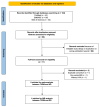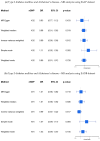Evaluating the Causal Association Between Type 2 Diabetes and Alzheimer's Disease: A Two-Sample Mendelian Randomization Study
- PMID: 40426922
- PMCID: PMC12108868
- DOI: 10.3390/biomedicines13051095
Evaluating the Causal Association Between Type 2 Diabetes and Alzheimer's Disease: A Two-Sample Mendelian Randomization Study
Abstract
Background/Objectives: Type 2 diabetes mellitus (T2DM) and Alzheimer's disease (AD) are significant global health issues. Epidemiological studies suggest T2DM increases AD risk, though confounding factors and reverse causality complicate this association. This study aims to clarify the causal relationship between T2DM and AD through a systematic review and meta-analysis of Mendelian randomization (MR) studies and a new two-sample MR analysis. Methods: A literature search across major databases was conducted through May 2024 to identify MR studies linking T2DM and AD. Fixed/random-effect models provided pooled odds ratios (ORs) with 95% confidence intervals (CIs), and heterogeneity was assessed with the I2 statistic. For our MR analysis, we pooled genetic variants from selected studies and analyzed AD outcomes using IGAP, EADB, and UKB databases. Multiple MR methods, including inverse variance weighted (IVW) and pleiotropy-robust approaches, were applied for validation. Results: Of 271 articles, 8 MR studies were included (sample sizes: 68,905 to 788,989), all from European ancestry. Our meta-analysis found no significant causal link between T2DM and AD (OR = 1.02, 95% CI: 1.00-1.04) with moderate heterogeneity (I2 = 31.3%). Similarly, our MR analysis using 512 SNPs as instrumental variables showed no significant associations in IGAP, EADB, or UKB data, which is consistent across sensitivity analyses. Conclusions: This meta-MR and MR analysis revealed no significant causal association between T2DM and AD, indicating that genetic predisposition to T2DM does not appear to causally influence AD risk, though modifiable clinical or environmental aspects of T2DM may still contribute to neurodegenerative processes. Further research should explore other mechanisms linking these conditions.
Keywords: Alzheimer’s disease; Mendelian randomization; type 2 diabetes.
Conflict of interest statement
The authors declare no conflicts of interest.
Figures






References
-
- Sun H., Saeedi P., Karuranga S., Pinkepank M., Ogurtsova K., Duncan B.B., Stein C., Basit A., Chan J.C.N., Mbanya J.C., et al. IDF Diabetes Atlas: Global, regional and country-level diabetes prevalence estimates for 2021 and projections for 2045. Diabetes Res. Clin. Pract. 2022;183:109119. doi: 10.1016/j.diabres.2021.109119. - DOI - PMC - PubMed
-
- Ong K.L., Stafford L.K., McLaughlin S.A., Boyko E.J., Vollset S.E., Smith A.E., Dalton B.E., Duprey J., Cruz J.A., Hagins H., et al. Global, regional, and national burden of diabetes from 1990 to 2021, with projections of prevalence to 2050: A systematic analysis for the Global Burden of Disease Study 2021. Lancet. 2023;402:203–234. doi: 10.1016/S0140-6736(23)01301-6. - DOI - PMC - PubMed
-
- World Health Organization Dementia. 20 September 2023. [(accessed on 14 April 2025)]. Available online: https://www.who.int/news-room/fact-sheets/detail/dementia.
-
- Kumar A., Sidh J., Lui F., Jack W.T. StatPearls [Internet] StatPearls Publishing; Treasure Island, FL, USA: 2024. [(accessed on 20 January 2025)]. Alzheimer Disease. [Updated 12 February 2024] Available online: https://www.ncbi.nlm.nih.gov/books/NBK499922/
Publication types
Grants and funding
LinkOut - more resources
Full Text Sources

